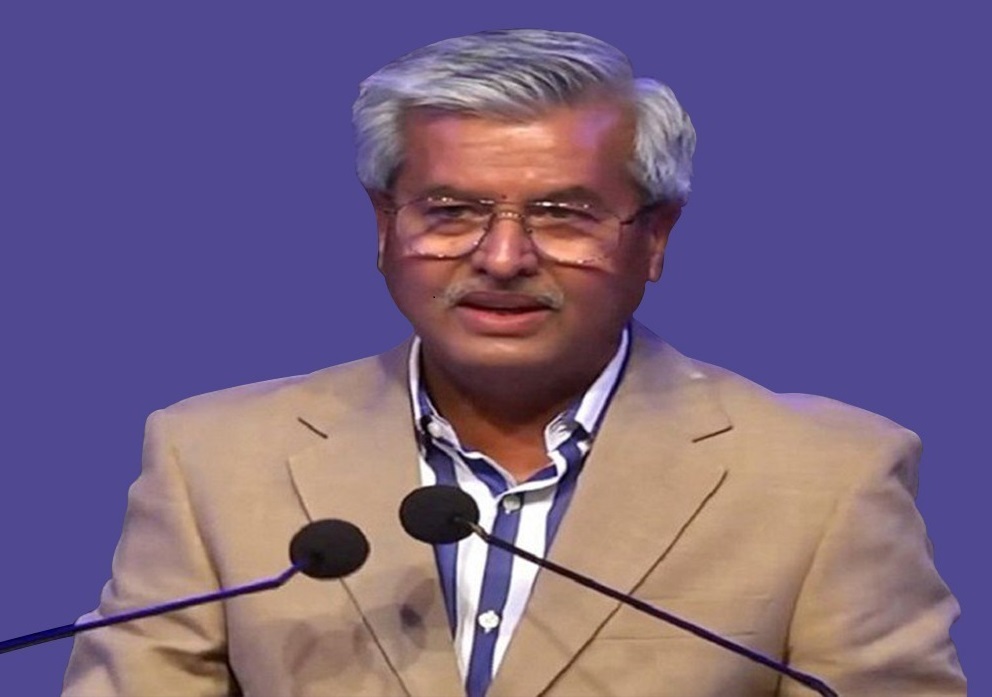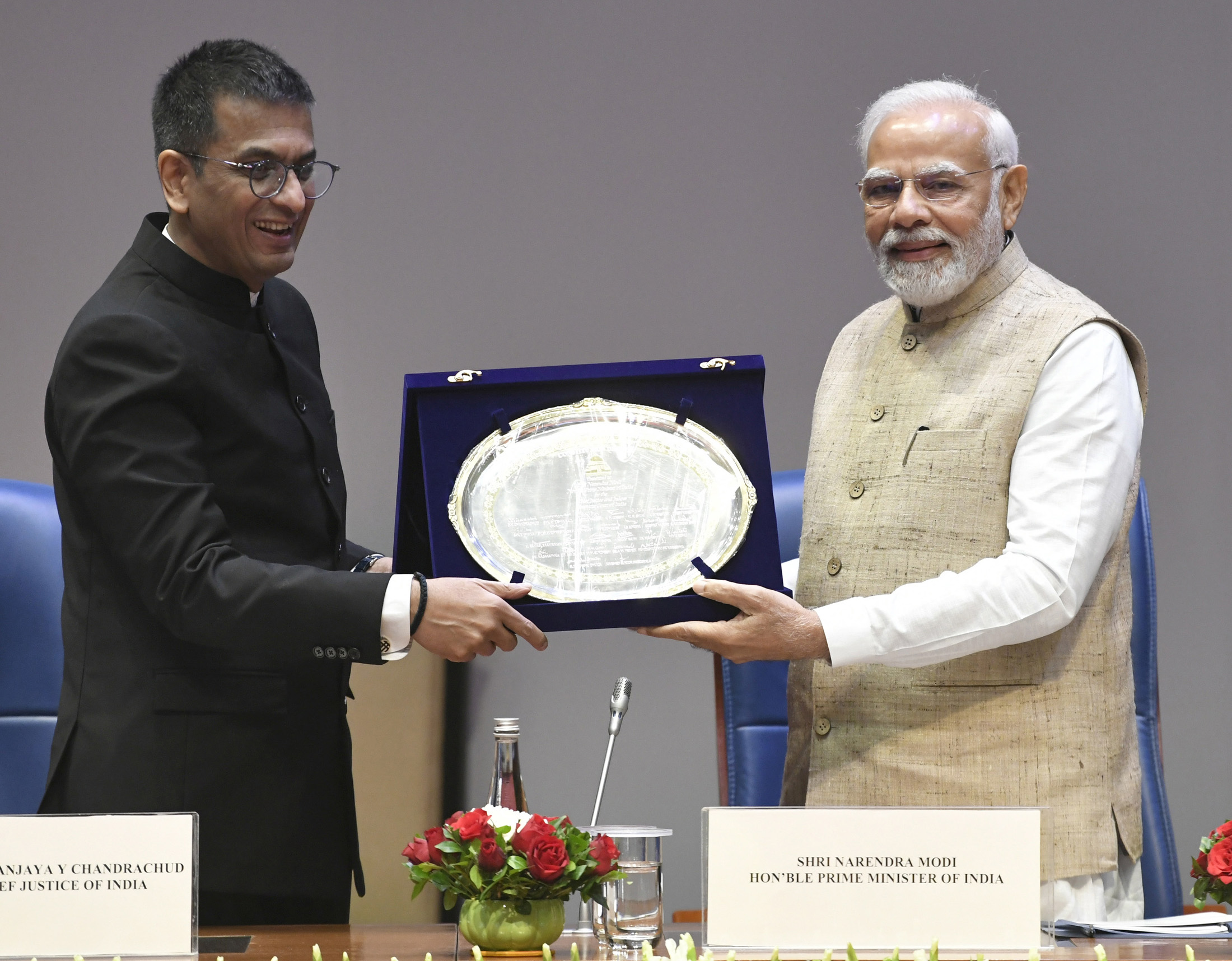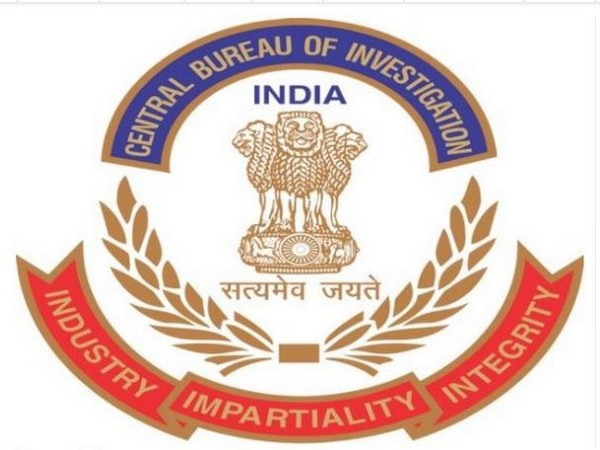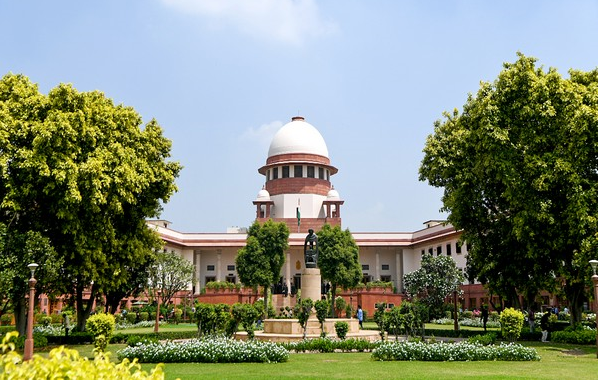
Sensitive cases shifted from one bench to other, senior advocate Dushyant Dave alleges in open letter to CJI
Former president of Supreme Court Bar Association and senior advocate Dushyant Dave on December 6 wrote an open letter to Chief Justice of India DY Chandrachud expressing his “anguish” on “sensitive” cases being taken away from specific benches and judges.
Cases, instead of remaining with the lead judge on a Bench, were listed before the associate judge when the latter starts heading a new Bench, which he said, is in clear violation of the Supreme Court Rules and the Handbook on Practice and Procedure of the Court which govern listing of cases. Most of these cases, Dave noted, were of matters pertaining to human rights, the functioning of constitutional institutions, democracy, freedom of speech etc.
“I have personally come across a number of cases listed before various Hon’ble Benches upon first listing and/ or in which notice have been issued, being taken away from those Hon’ble Benches and listed before other Hon’ble Benches. Despite first coram being available the matters are being listed before Hon’ble Benches in which second coram presides,” Dave wrote in the letter.
He further specifically mentioned that matters listed before Court No. 2, 4, 6, 7 amongst others have been shifted out and listed before other Benches, which is in clear violation of the Supreme Court Rules.
Curiously, the Seniority of the first coram is also being ignored in doing so, he said. “Our attention is also been drawn by esteemed Colleagues at the Bar, Seniors, and Advocates on Record (AoRs), about various cases in which they have appeared in the first instance on numerous occasions, later the matters being listed before different Benches,” the letter stated.
While Dave refused to enumerate further on these matters as many of them are pending before the court, he urged the CJI to look into the matter and take corrective measures immediately, as “such a practice does not augur well for the institution.”
The development comes a day after a petition challenging the Union government’s delay in appointing judges whose name had been cleared by the Collegium was not listed before Justice S.K. Kaul on Tuesday (December 5), even though it was earlier decided to be placed before him. Justice Kaul said neither had he deleted the matter from the cause list, nor was he unwilling to hear it. He had earlier heard the matter on November 20 and then posted it for December 5
“I had not deleted it or expressed unwillingness to take it up. I am sure the CJI is aware of it (the deletion). Some things are best left unsaid. We will see,” Justice Kaul said, according to Bar and Bench.

Unstamped arbitration agreements invalid in law, says Supreme Court
A Constitution Bench of the Supreme Court on Tuesday ruled an arbitration agreement in an unstamped contract, that is without stamp duty having been paid or paid insufficiently, was not enforceable and was not valid. “Arbitration agreement not validated by the Stamp Act would stand non est (does not exist) in law ,” the majority (three against two) verdict held.
Legal experts said while this judgment would give some clarity and predictability, the interpretation that not paying stamp duty or paying it insufficiently on a contract with an arbitration clause would make the arbitration agreement invalid would lead to a situation of no timely recourse for resolving disputes.
“This will put a spanner in the works of many ongoing arbitral proceedings, with respondents taking nonpayment or insufficient payment as a preliminary objection for delaying the process. This will hamper urgent relief for a defect like the non-stamping of an agreement, which is curable. Also, in the case of unstamped international contracts not executed in India, it will complicate the process further,” said Vyapak Desai, lead, international dispute resolution and investigations practice, Nishith Desai Associates.
A five-judge Bench of Justice K M Joseph, Justice Ajay Rastogi, Justice Aniruddha Bose, Justice Hrishikesh Roy, and Justice C T Ravikumar decided whether the arbitration clause in a contract, which is required to be registered and stamped but has not been done, was valid and enforceable.
Justice Joseph, Justice Bose, and Justice Ravikumar ruled that “an instrument which is exigible (capable of being exacted) to stamp duty may contain an arbitration clause and which is not stamped cannot be said to be a contract enforceable in law within the meaning of Section 2(h) of the Contract Act (definition of contract) and is not enforceable under Section 2(g) of the Contract Act (void contracts)”. However, Justice Rastogi and Justice Roy said, in their dissenting opinion, that non-stamping or insufficient stamping would not render the arbitration agreement unenforceable. They said that such a defect (stamp deficiency) was curable.
In this case (NN Global Mercantile Pvt Ltd v. Indo Unique Flame Ltd & ors) the parties had entered into a sub-contract with an arbitration clause. After some dispute, the respondent had brought a suit invoking the bank guarantee furnished by the petitioner. The respondent had sought a resolution of the dispute through arbitration, which was rejected by a commercial court. Later, the Bombay High Court held the suit maintainable, which was then challenged before the apex court.
Tejas Karia, partner and head, arbitration, Shardul Amarchand Mangaldas & Co, said the decision missed an opportunity to shore up the image of India as an arbitration-friendly jurisdiction.
The issue has been a bone of contention in several arbitration matters since the judgment in the case of SMS Tea Estates in 2011, followed by Garware Wall Ropes in 2019. The tilt of the law kept changing over time through various judgments in different contexts, leading to ambiguities and different positions taken by various courts in India. “The judgment settles the law with respect to an un-stamped agreement containing an arbitration clause, and will give finality and closure to litigation on this aspect before various HCs wherein varying views had emerged,” said Simran Brar, partner at Karanjawala & Co. Aslam Ahmed, partner, Singhania & Co. LLP, said the recent trend in arbitration had been minimum judicial intervention and this had consistently meant the court appointing an arbitrator had just to look at the arbitration clause.
(Source: Business Standard)

CJI Chandrachud takes daughters to Supreme Court, explains his job
The Chief Justice of India (CJI) DY Chandrachud’s foster daughters Mahi (16) and Priyanka (20), who have disabilities, expressed desires to see the Supreme Court.
To fulfil their wish the Chief Justice of India took them to the Supreme Court on January 6 and gave them a tour of the courtroom. Justice Chandrachud took his two foster daughters to his chamber and explained the work of the court.
According to sources, Justice Chandrachud, who reached the court premises around 10 am, took his daughters to his courtroom (first court) through the visitor’s gallery before the scheduled court timing of 10.30 am and told them, “See, this is where I sit.”
The sources said the CJI took his daughters to his chamber while explaining about his workplace and showed them the place where the judges sit and from where the lawyers argue their cases, PTI reported.
They said Justice Chandrachud brought his foster daughters, both differently-abled, to the court after they expressed desire to see his workplace.
CJI Chandrachud himself escorted them to his chamber and to Court Number 1 through the public gallery where he conducts all his hearings.
As per information, he was calmly explaining to his daughters, Mahi (16) and Priyanka (20), about the courtroom and the way proceedings were heard in the courtroom. CJI DY Chandrachud took over as CJI in November, 2022 and will serve for two years. He has two sons, Abbhinav and Chintan, who are lawyers at Bombay High Court and Brick Court Chambers, London, respectively.

Nowadays it has become a fashion to comment on earlier decisions of the Collegium: SC
Nowadays it has become a “fashion” for the former judges to comment on earlier decisions of the Collegium on the appointment of judges in the Supreme Court and high courts, the Supreme Court has said adding that the apex court was the “most transparent institution”.
“We do not want to comment on anything said by former members [of the Supreme Court Collegium]… We don’t want to say or comment on them at all… Nowadays it has become a fashion to comment on earlier decisions when they were part of the Collegium,” Justice M.R. Shah, leading a Bench, said.
The Supreme Court on December 2, 2022 said it had become a “fashion” for its former judges to comment on earlier decisions of the Collegium when they were part of it while adding that the apex court was the “most transparent institution”.
“We do not want to comment on anything said by former members [of the Supreme Court Collegium]… We don’t want to say or comment on them at all… Nowadays it has become a fashion to comment on earlier decisions when they were part of the Collegium,” Justice M.R. Shah, leading a Bench, said.
The oral observation came during the hearing of an appeal filed by activist Anjali Bhardwaj, who had applied under the Right to Information (RTI) Act to the Supreme Court for a copy of the agenda, decision and resolution of a Collegium meeting held on December 12, 2018.
The Supreme Court Public Information Officer (PIO) had said the information was confidential and disclosure would amount to contempt of court. The First Appellate Authority and the Central Information Commission found that though “certain decisions” were taken on December 12, the “required consultation” did not take place and hence there was no resolution. In appeal, the Delhi High Court had concluded that the Collegium decision was probably “verbal” and did not “crystallise” into a written record to be termed ‘information’ under the RTI Act.
On Friday, advocate Prashant Bhushan, for Ms. Bhardwaj, referred to an article by Justice Madan B. Lokur, a former Supreme Court judge, affirming there was an agenda of the Collegium meeting held on December 12 and “certain decisions” had indeed been taken.
Mr. Bhushan further pointed to excerpts in the autobiography of former Chief Justice of India Ranjan Gogoi about the December 12 meeting. Justice Gogoi had headed the Collegium at the time and Justice Lokur was part of that Collegium. The meeting was held to consider names for appointment to the Supreme Court and transfers of Chief Justices of High Courts. Justice Lokur had retired when the court went into winter recess soon after the December 12 meeting.
A newly-constituted Collegium, with Justice (now retired) Arun Mishra joining in, had met on January 10, 2019. A resolution published of the January 10 meeting had recorded that decisions were taken in the previous meeting, but intervening winter holidays and the reconstitution of the Collegium had interrupted consultations. The January 10, 2019 Collegium resolution had recommended Justices Dinesh Maheshwari and Sanjiv Khanna as Supreme Court judges.
A public debate in the media had ensued at the time on why the Collegium had “dropped” its December 12, 2018 proposal to recommend Delhi High Court Chief Justice Rajendra Menon and Rajasthan High Court Chief Justice Pradeep Nandrajog (both are now retired) and, within days, pick then Karnataka High Court Chief Justice Maheshwari and Justice Khanna, a Delhi High Court judge. Both Justices Maheshwari and Khanna are now serving apex court judges. Justice Khanna is in line to be the next Chief Justice of India according to the seniority norm.
‘General impression’
Mr. Bhushan said a “general impression” may arise that the Supreme Court, which had once upheld the right to information as a fundamental right in several of its judgments, was now “backtracking”.
“Transparency requires that whatever decision, if it is in writing, be disclosed to citizens. If the decision is not in writing, let the PIO say so,” he argued. Mr. Bhushan asked if the decision had not been converted to writing, why did the January 2019 resolution say that “a decision was taken”.
“The Supreme Court is not backtracking at all. We are the most transparent institution… An oral decision may have been taken [in the December 12, 2018 Collegium meeting]. You are not entitled to the oral decisions… The decision may not have been converted to writing… So many things could have been discussed in the Collegium meeting,” Justice Shah, who is a member of the current Collegium headed by Chief Justice D.Y. Chandrachud, responded.
The court reserved the appeal for judgment. The past weeks had seen Union Law Minister Kiren Rijiju launch a vocal and very public criticism of the “opacity” in the functioning of the Collegium.
(Source: The Hindu)

The world has changed, the CBI must also change, says Supreme Court
The Central Bureau of Investigation (CBI) must keep up with changing world, the Supreme Court has said underlying the need for reforms in the top investigation agency of India.
“The world has changed, the CBI must also change,” the Supreme Court said on 5th December as it heard a plea seeking guidelines for safeguarding academic work that is stored in digital devices seized by investigative agencies.
The remark by Justice S K Kaul came after the other judge on the bench, Justice A S Oka, said he had seen the CBI manual and that “it requires a lot of updation”.
In its affidavit filed in response to the plea, the Centre has said the issue can be addressed by adherence to the CBI Manual, 2020, which it said contains a detailed SOP besides safeguards regarding the seizure of electronic evidence.
The CBI manual “has various provisions dealing with the present subject matter and would substantially allay the apprehensions of the petitioner while balancing the competing legitimate state interest within the confines of Indian Constitutional and statutory framework”, the Centre added. The court fixed the matter for hearing next on February 7.

Purpose of charity should not be religious conversion: Supreme Court
Charity or good work is welcome but if it is intended for religious conversion then it is a serious issue, the Supreme Court of India has said, taking a tough stand on forced religious conversion.
Hearing a plea filed by advocate Ashwini Kumar Upadhyay on 5 December 2022, a bench of Justices M R Shah and C T Ravikumar noted that forced conversion is against the Constitution.
“The purpose of charity should not be conversion; every charity or good work is welcome, but what is required to be considered is the intention,” the court said.
The court was hearing a petition filed by advocate Ashwini Kumar Upadhyay seeking direction to the Centre and states to take stringent steps to control fraudulent religious conversion by “intimidation, threatening, deceivingly luring through gifts and monetary benefits”.
The Centre told the court it is collecting information from states on religious conversion through such means.
Appearing before the bench, Solicitor General Tushar Mehta sought time to furnish detailed information on the issue.
“We are gathering information from the states. Give us a week’s time,” Mehta said. He said statutory the regime will determine whether a person is converting due to some change in belief.
The top court acknowledged forced religious conversion is a very serious matter.
“Do not take it as adversarial. It is a very serious issue. Ultimately it is against our Constitution. When everyone stays in India, they have to act per the culture of India,” the bench observed.
The apex court will now take up the matter on December 12.
Forced religious conversion may pose a danger to national security and impinge on religious freedom of citizens, the top court had said recently, and asked the Centre to step in and make sincere efforts to tackle the “very serious” issue.






